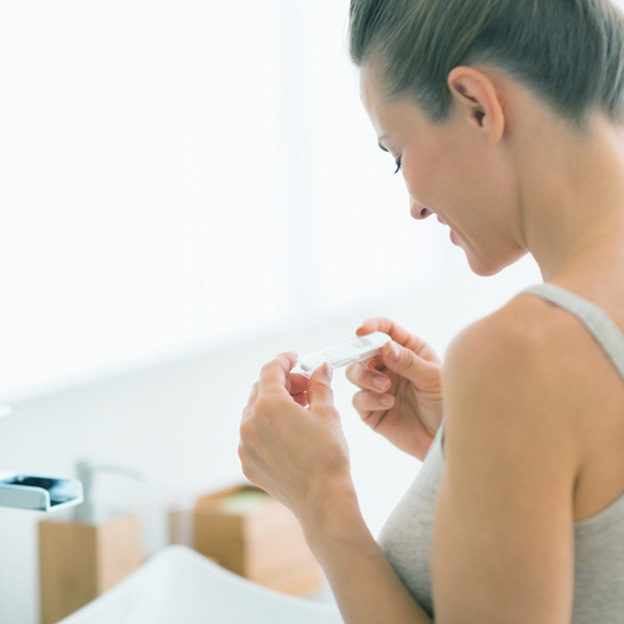Do you think you might be pregnant? Can’t wait to find out? These days, there are simple and effective ways to quickly determine whether or not you are pregnant, and many are actually available at the pharmacy. Here is more information about pregnancy tests.

Your period is a few days late, your breasts are sore, you are feeling unusually tired and nauseous, especially in the morning. Could you be pregnant?
At the beginning of a pregnancy, some women experience symptoms and some don’t. Therefore, you can’t rely on the presence or absence of symptoms to determine whether or not you are pregnant. The best way to confirm or rule out a pregnancy is to take a pregnancy test.
How these tests detect pregnancy
Pregnancy tests detect the presence of a hormone called human chorionic gonadotrophin (or hCG), which is produced by the embryo shortly after conception (when the sperm cell meets the ovum). When there is a large quantity of this hormone in the mother’s blood or urine, it allows to detect a pregnancy.
There are two ways to take a pregnancy test: you can get one that detects the hormone in urine at the pharmacy or you can go to the hospital for a blood test. Blood tests are usually more accurate, but urine tests do have several advantages and are a good choice since they are:
- easy to find (on pharmacy shelves);
- easy and quick to use;
- available at low cost.
When to take the test
A pregnancy test can be taken after unprotected sexual intercourse or at any time when you suspect a pregnancy. Certain signs or symptoms can suggest pregnancy, such as:
- absence of menstruation;
- nausea or vomiting, especially in the morning;
- sore breasts;
- unusual fatigue;
- increased appetite.
If you think you may be pregnant, whether the pregnancy is desired or not, you will probably want to know as soon as possible. These days, some of the tests that are available on the market can detect pregnancy very early on, up to five days before your period, after unprotected sexual intercourse. Other tests are meant to be taken later on, but most can detect pregnancy on the first day of a missed period or earlier. Read the manufacturer’s instructions to make sure that your results are reliable.
The right method
Urine pregnancy tests are easy to use. The process is similar from one brand to another, but you should always read the manufacturer’s instructions thoroughly. Each test features a strip on which you put the urine.
- There are two ways to put urine on the test strip:
- Urinate directly on the strip (pointed downward) for a few seconds.
- Urinate in a clean container and dip the test strip in the container for a few seconds.
- Wait a few minutes while holding the test strip downward.
- Read your results. The manufacturer’s instructions will tell you how to interpret them.
All pregnancy tests sold at the pharmacy are similar. They do differ, however, in the way they display results. For example, if you are pregnant, the test may read “+”, “yes” or display a specific colour. This is known as a positive test. The delay required for each test is also similar from one brand to the next. Ask your pharmacist about each one’s characteristics.
If the test is negative…
If the pregnancy test indicates that you are not pregnant, the result is still not 100% certain. Several factors can indeed falsify results. Here are some factors that can impact the outcome:
- test taken too early;
- urine is too diluted;
- It is best to use morning urine.
- You should avoid drinking before taking the test.
- misreading the result (especially for tests that use colours);
- using an expired test.
It is also possible for a test to indicate that you are pregnant when you actually are not. This possibility, however, is very rare. Certain medications, such as those taken for fertility, can lead to a false positive. After a pregnancy, miscarriage or abortion, it is also possible for a test to show a positive result.
In general, test results are extremely reliable. If you get a negative result, your period may start in a few days. If, after seven days, you still don’t get your period, you can take a second test. If the result is still negative, consider seeing a doctor. It is also important to note that pregnancy tests are designed for screening purposes and do not replace the necessity of getting a medical diagnosis.
Advice for future moms
If you wish to become pregnant, take note of the following tips:
- Talk to your pharmacist about folic acid, an essential vitamin for foetal development and safe pregnancy. All women who wish to have a baby should take vitamin supplements containing folic acid and start a few weeks before conception. Your pharmacist can tell you more about this.
- Stop smoking as soon as possible since this habit is very harmful to you and your child. Your pharmacist can help you in the process of quitting cigarettes for good. Ideally, see him or her before becoming pregnant.
- Avoid consuming alcohol. Reducing your intake of alcohol at the moment you decide you want to become pregnant provides your child with a healthy environment that promotes his or her development. Avoiding alcoholic beverages altogether is an even safer choice. Because it is impossible to determine the exact moment of conception, it is best to abstain from drinking as soon as you start trying to conceive, especially since exposure to alcohol during the first trimester can be particularly harmful to the embryo/foetus.
If you are pregnant, all you need to do is make an appointment with your doctor. She or he will follow you throughout your pregnancy. And don’t forget that your pharmacist can not only help you with pregnancy tests, but also accompany you during your pregnancy to make sure it is a healthy one. Then, once your precious baby is born, your pharmacist will always be there to help you maintain her or his well-being and health, as well as yours!
